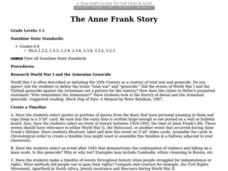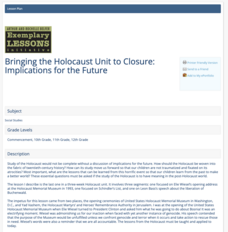Curated OER
A Modern Connection to Genocide
Learners investigate the genocide that occurred in Rwanda. They read and discuss an article, watch a Frontline video, complete a worksheet for the video, and write a letter to the Rwandan government or United Nations about the...
Curated OER
Genocide in History
In this genocide in the 20th century study guide worksheet, students read the notes provided and add notes of their own.
Curated OER
The Anne Frank Story
What is genocide? Create timelines regarding the human genocide. Middle and high schoolers analyze information that requires them to consider links between Armenian genocide and the Holocaust. In groups, theydesign timelines that...
Curated OER
What was the outside world's reaction to the genocide?
Ninth graders study the worlds reaction to genocide. In this World History lesson plan, 9th graders develop a viewpoint on the world's reaction to this genocide.
Curated OER
The History of the Holocaust From A Personal Perspective
Students research and identify how Holocaust events affected lives of real people who lived in Europe from 1933 through 1945 and after, and create original artwork, poetry, and essays that reflect understanding of Holocaust, and its...
Facing History and Ourselves
Identity and Belonging
High schoolers examine World War I war crimes. For this world history activity, students examine a painting by Ashile Gorky, a refugee from the Armenian genocide. High schoolers interpret the piece of art and discuss its historical...
Facing History and Ourselves
Analyzing Historical Evidence
High schoolers examine World War I war crimes. In this world history instructional activity, students use primary and secondary sources to research and understand the systematic nature of the Armenian Genocide. High schoolers reflect on...
Facing History and Ourselves
Denial and Free Speech
Learners explore the meaning and implications of genocide. For this Armenian genocide activity, learners investigate the genocide that took place in Turkey.
Facing History and Ourselves
The Range of Choices
Learners examine crimes against human rights. In this world history instructional activity, students watch a segment of a video about the Armenian Genocide. Learners reflect on the crimes of the Ottoman government in classroom...
Facing History and Ourselves
We and They, the Armenians in the Ottoman Empire
Learners examine World War I war crimes. For this world history instructional activity, students use primary and secondary sources to research and understand the action taken by the United States during the Armenian Genocide. Learners...
Echoes & Reflections
Studying The Holocaust
While many young scholars are familiar with the Holocaust, they may not understand the specific history that led to the unprecedented atrocity. The first lesson in the unit helps teachers gauge their pupils' background knowledge. A...
Echoes & Reflections
The "Final Solution"
Nazi policies shifted from deportation and imprisonment to extermination of the Jewish people in death camps in the "Final Solution." Learners examine photos of artifacts, read poetry written by survivors, analyze testimony from...
Curated OER
Teaching About Genocide
Students can find that genocide is a prevalent theme in world history.
Curated OER
Nation Building
Ninth graders examine the role of the United States in nation building. In this World History activity, 9th graders evaluate the role of the United States in building nations in other parts of the world.
Curated OER
Films That Make A Difference in History Lesson Plans
Showing films or other types of media in the classroom is a great way to bring history lesson plans alive.
US Holocaust Museum
Time Capsule in a Milk Can
Imagine dumping out a milk can and finding letters from one of the darkest moments in history! Scholars use Holocaust Reading Passages and research to discover how people recorded and hid history during the events of World War II. They...
Curated OER
The Norman Yoke
Define the causes and conflict associate with the Battle for Hastings. Each slide presents basic information on battles, castles, and Genocide which occurred around 1066. The information is at times obscured by images and focuses heavily...
Curated OER
Interative History Notebook Mini-lesson
High schoolers respond to Holocaust literature. In this interactive history lesson, students select quotes from chapter 1 of Elie Wiesel's Night and reflect on their meaning as they record their thoughts on poetic, prose, comic. or...
Curated OER
Ghosts of Rwanda: Reconciliation and Reparations
Students examine a specific case of genocide participation in Rwanda. Working in groups, they simulate the courtroom drama, from the positions of victim, perpetrator, and court monitor. They conclude by writing essays on the...
Facing History and Ourselves
The Holocaust: Bystanders and Upstanders
Scholars analyze the role of bystanders during the Holocaust. The investigation explores the roles of the bystanders, upstanders, and rescuers with primary and secondary resources to determine actions taken—or not—and their implications...
Curated OER
What Concepts are being presented
World War II, WWII, the Holocaust, the Rise of the Nazi Empire, Concentration Camps, the effect on children. The first 9 slides are of images and scenes of WWII, Black and white photography Slides 10 to 20 show present day photos of...
Curated OER
Maurie Japarta Ryan, Oral History Analysis
Students research Australian History as it relates to the separation of Aboriginal and Torres Strait Islander children from their families. In this Maurie Japarta Ryan lesson, students apply specific skills pertaining to...
Curated OER
Genocide, Sovereignty, Humanitarian Intervention and Accountability
Twelfth graders examine the attempts by various countries to genocide their members. In groups, they compare and contrast the responses by the other countries of the world to stop the genocide. They also identify cases in which the...
Curated OER
Bringing the Holocaust Unit to Closure: Implications for the Future
Students study the history of the Holocaust. it is complex; therefore, understanding its implications is complex as well. Elie Wiesel refers to the Holocaust as a question within a question. Questions lead to further questions, and still...

























